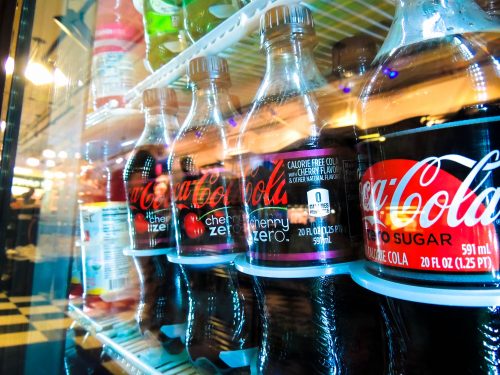Diet Coke, Vitamin Water Zero, Minute Maid Light: with the hype over healthy living and weight loss, the food industry has introduced many low-calorie drinks to the market. Most of these beverages use artificial sweeteners, which provide the same sweet taste with fewer or no calories. But what effects do the artificial sweeteners have on our body? Are they safe, after all? The hidden effects of artificial sweeteners on our body have been long disputed.
According to research conducted by Yale School of Medicine scientists, the mismatch between the sweet taste and caloric value in diet beverages could explain the link between artificial sweetener use and cases of metabolic failure, such as in diabetes. Because the brain cannot register how much sugar was consumed, our body cannot properly digest and process the diet beverages.
A sweet taste helps indicate the amount of energy present in a food source. “Our bodies evolved to efficiently use the energy sources available in nature,” said senior author and Yale psychiatry professor Dr. Dana Small. She continued, “Our modern food environment is characterized by energy sources our bodies have never seen before.” When a beverage tastes too sweet or not sweet enough for the number of calories it contains, the signal communicating its nutritional value can be disrupted. Our metabolism is confused, and the beverage cannot be digested properly.
Small and her colleagues discovered the problems of “diet” beverages when performing an experiment on brain responses to sugar ingestion. The team observed the brain activity of fifteen healthy participants after drinking tasteless sugary drinks. Normally, when sugar is introduced to the body, the brain releases dopamine, a chemical compound that induces reward and pleasure. However, when the participants drank tasteless but sugary drinks, the amount of dopamine released was not proportional to the calories in the beverage. “In other words, the assumption that more calories trigger greater metabolic and brain response is wrong,” Small said. She was interested in pursuing this further, commenting, “A strange finding that makes no sense means that you’re going to learn something new.”
Further research revealed that a sweet taste also determines how sugar is metabolized and signaled to the brain. Small said, “Calories are only half of the equation; sweet taste perception is the other half.” In fact, sweet low-calorie drinks could produce greater metabolic response and higher dopamine levels than less sugary higher-calorie drinks.
In nature, when sweetness reflects the number of calories in the food, the body properly metabolizes the calories and activates the corresponding brain reward signals. However, the modern food industry introduces beverages with the kind of sweetness that our body hasn’t been exposed to before. “A calorie is not a calorie,” said Small, commenting on how the impact of these drinks on our bodies goes beyond just the number of calories. When sweetness and calories don’t align, like in artificially sweetened drinks, the beverage fails to trigger metabolism and the brain reward circuits can’t register the number of calories consumed. The metabolic failure observed here could help explain the link between artificial sweeteners and problems like diabetes.

